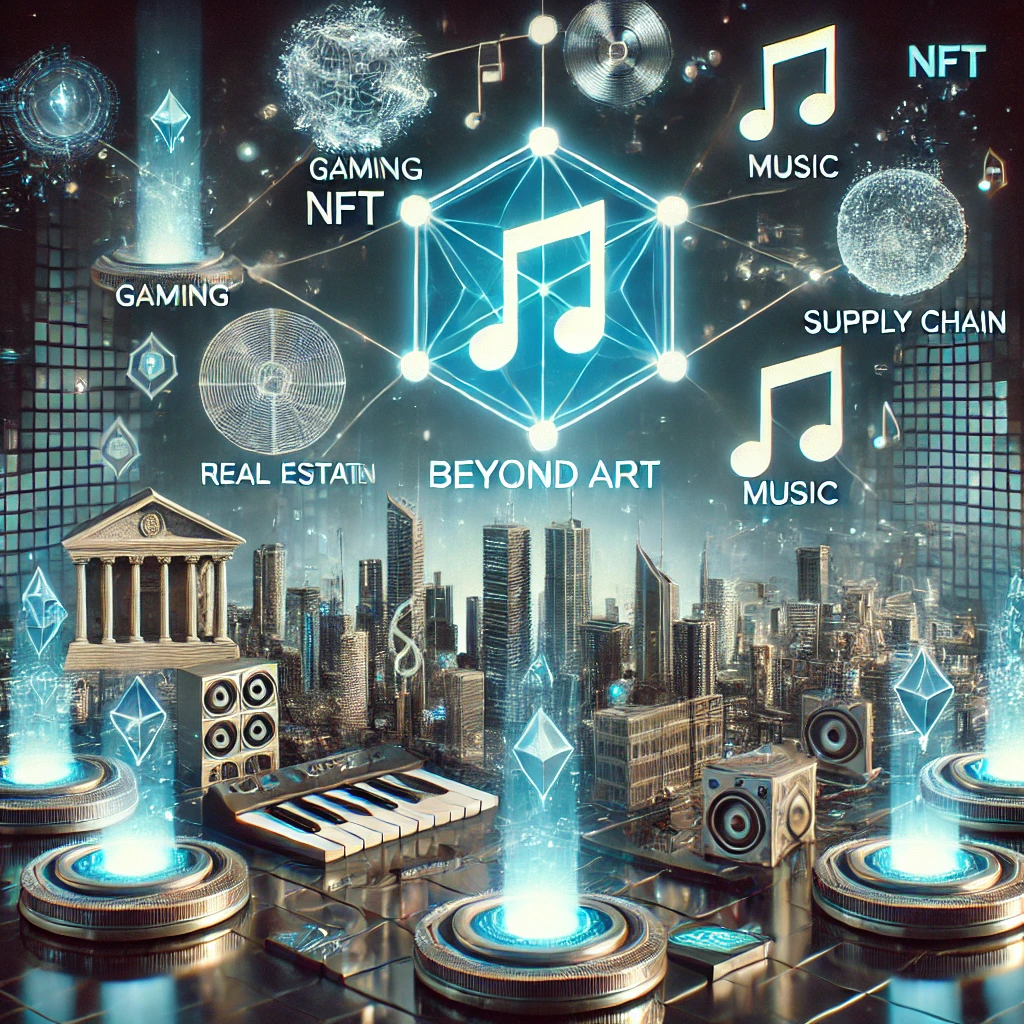Table of Contents
Introduction: The Expanding Horizon of NFTs
Non-Fungible Tokens (NFTs) first gained widespread attention through digital art, with record-breaking sales and high-profile collectors. However, NFTs are no longer limited to art and collectibles. As blockchain technology evolves, NFTs are finding applications in gaming, real estate, entertainment, supply chain management, and digital identity verification. This article explores the growing role of NFTs beyond art and how they are reshaping various industries.
NFTs in Gaming: Revolutionizing Digital Ownership
NFTs have revolutionized the gaming industry by providing true ownership of in-game assets. Traditionally, gamers purchase skins, weapons, or characters within centralized gaming ecosystems but do not have real ownership. With NFTs, players can buy, sell, and trade their in-game assets on decentralized marketplaces, often for real-world value.
Key Aspects of NFTs in Gaming:
- Play-to-Earn (P2E) Models: Players can earn NFTs by completing in-game achievements and trading them for cryptocurrency. Examples include Axie Infinity, The Sandbox, and Gods Unchained.
- Interoperability: NFT-based assets can sometimes be used across multiple games or metaverse platforms, allowing for a more integrated gaming experience.
- Scarcity and Value: Unlike traditional gaming assets, NFTs are verifiable on the blockchain, ensuring authenticity and rarity.
NFTs in Real Estate: Tokenizing Property Ownership
The real estate sector is exploring NFTs as a tool for fractional ownership and transparent property transactions. By tokenizing real estate assets, buyers and sellers can trade property fractions efficiently.
Benefits of NFTs in Real Estate:
- Fractional Ownership: Investors can purchase shares in properties through NFTs, lowering the barrier to real estate investment.
- Smart Contracts for Transactions: Automated, self-executing contracts eliminate the need for intermediaries, reducing transaction fees and processing time.
- Notable Examples: Platforms like Propy and RealT are already leveraging blockchain to tokenize real estate assets.
NFTs in Music and Entertainment
Artists and musicians are using NFTs to gain more control over their work and monetize content directly. By minting music as NFTs, creators can bypass traditional distribution channels, retaining greater profits and engaging directly with fans.
Key Use Cases:
- Royalty Distribution: Smart contracts ensure that creators receive automatic royalty payments every time an NFT is resold.
- Exclusive Fan Engagement: Musicians can offer exclusive content, early access to songs, or concert tickets via NFTs.
- Success Stories: Artists like Kings of Leon and 3LAU have successfully released albums as NFTs, generating millions in sales.
NFTs in Intellectual Property and Digital Identity
NFTs are emerging as a powerful tool for securing intellectual property rights and digital identities.
How NFTs Enhance IP and Identity:
- Tokenizing Copyrights & Patents: Creators can register and sell their intellectual property through NFTs, ensuring proof of authenticity and ownership.
- Decentralized Identity Solutions: NFTs enable verifiable and secure digital identities, reducing the risk of identity theft. Companies like Civic and Microsoft are developing NFT-based identity verification solutions.
NFTs in Supply Chain and Authentication
The supply chain industry is using NFTs to track and verify the authenticity of goods.
Applications of NFTs in Supply Chain:
- Luxury Goods & Fashion: Brands like Louis Vuitton and Nike use NFTs to authenticate products and prevent counterfeiting.
- Food & Agriculture: NFTs can track the journey of food products from farm to table, ensuring transparency.
- Vehicle Verification: Automakers use NFTs to document the history of vehicles, including ownership transfers and repairs.
NFTs in Ticketing and Memberships
NFTs are reshaping the ticketing industry by eliminating fraud and offering digital proof of ownership.
Use Cases:
- Event Ticketing: Organizers use NFTs to issue verifiable, non-duplicable tickets. This prevents scalping and ticket fraud.
- Exclusive Memberships: Brands and influencers offer NFT-based memberships with perks such as premium content and VIP event access.
- Notable Examples: Coachella and NBA Top Shot have successfully issued NFT-based tickets.
The Role of NFTs in the Metaverse
NFTs serve as the backbone of digital economies in virtual worlds. Users can buy virtual land, customize avatars, and trade assets seamlessly.
Key Aspects of NFTs in the Metaverse:
- Virtual Real Estate: Platforms like Decentraland and The Sandbox allow users to buy, sell, and monetize digital land.
- Avatar Customization & Digital Fashion: Users can dress their avatars with NFT wearables.
- Business & Commerce: Virtual marketplaces powered by NFTs enable decentralized trade and brand presence in the metaverse.
Challenges and Criticisms of NFTs Beyond Art
While NFTs offer immense potential, they also face several challenges and criticisms:
- Scalability & High Gas Fees: Transactions on networks like Ethereum can be expensive, limiting accessibility.
- Regulatory Uncertainty: Governments are still developing legal frameworks for NFTs.
- Speculation & Scams: The market is prone to price volatility, rug pulls, and fraudulent projects.
- Environmental Concerns: Energy-intensive blockchains raise sustainability questions, though greener alternatives like Solana and Tezos are emerging.
The Future of NFTs: What Lies Ahead?
The NFT space is still evolving, with new innovations on the horizon.
Predictions for NFT Growth:
- Integration with AI & IoT: NFTs will interact with artificial intelligence and the Internet of Things, enhancing their utility.
- Cross-Chain Solutions: Efforts to improve NFT interoperability across different blockchains will gain traction.
- Institutional Adoption: Governments and large corporations will explore NFT use cases for record-keeping, licensing, and authentication.
The Evolution of NFTs in the Digital Economy
NFTs have moved beyond digital art to impact numerous industries, from gaming and real estate to identity verification and the metaverse. As blockchain technology matures, NFTs will continue to unlock new opportunities and redefine digital ownership. While challenges remain, the potential for widespread adoption is undeniable. The future of NFTs goes far beyond art, setting the stage for an increasingly decentralized and tokenized world.















